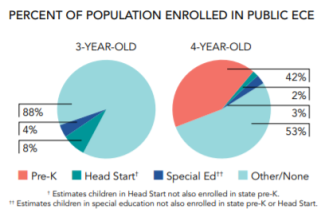
Maine Children’s Alliance
The State of Preschool 2018
May 9, 2019
This post originally ran on the blog Maine Kids VOICE.
According to a recent report released by the National Institute for Early Education Research (NIEER) more children are attending state-funded pre-K programs across the US, but state funding is not keeping pace, resulting in low compensation for pre-K teachers that threatens to undermine the quality and sustainability of programming.
The State of Preschool 2018 annual report, based on 2017-18 academic year data, finds just a third of 4-year-olds and 5.5 percent of 3-year-olds enrolled in public preschool programs—which indicates virtually no change in years. Generally, state spending per child has decreased, when adjusted for inflation; and most states are not compensating pre-K teachers comparably to K-3 teachers, which threatens the viability of that workforce.
“We are disappointed by the lack of progress and concerned about how many children miss out on quality early learning experiences that can make a lifelong difference,” said NIEER Founder and Senior Co-Director Steven Barnett, Ph.D. “Some states are moving in the right direction, but many are standing still.”

Echoing national trends, in Maine, while programs served more children, funding decreased overall (adjusted for inflation) and per student. In 2017-2018, preschool enrolled 5,648 children, an increase of 208 children from the prior year. State funding totaled $15,533,631, down $3,887,010 (20%), since last year. State spending per child equaled $2,750 in 2017-2018, down $820 from 2016-2017. Maine met 9 of 10 quality standards benchmarks; ranked 12th in access for four-year-olds; and ranked 38th in state spending. The full state profile can be viewed here.
This year, the Maine Department of Education (DOE) was awarded a Preschool Development Grant Birth through Five award in 2018 for over $1 million to conduct a needs assessment of programs and services for children birth to age five and their families to determine overlaps and gaps. After the completion of the needs assessment, Maine DOE, Department of Health and Human Services, and multiple stakeholders will create a strategic plan to guide their work in early childhood systems at both the state and local level.
The NIEER State of Preschool 2018 yearbook is the only national report on state-funded preschool programs, tracking enrollment, spending, and policies to support quality since 2002. This year’s report includes a special section on policies affecting preschool teachers.
The information and data in this report allows us an opportunity to evaluate how we are serving preschoolers both in the nation and in our state. Early childhood education is an important tool in preparing young children for future academic success and beyond – but quality needs to be high. Some of the state programs that met few quality standards serve the highest numbers of children. Quality also varies within state programs, with some states setting different policies for pre-K classrooms in public schools versus private or nonprofit centers.
In order to reap the full short- and long-term benefits of early care and education, it is critical that states invest in high-quality programs, by increasing their per-pupil investments, and by adequately compensating the educators who are responsible for the early learning of our children. By establishing a strong foundation in early education, we can ensure children reach their full potential, and provide for a brighter future for our communities and our state overall.
The Maine Children’s Alliance is a nonpartisan, public policy nonprofit advocating for sound public policies and practices that improve the lives of Maine children, youth and families.
About NIEER
The National Institute for Early Education Research (NIEER) at the Graduate School of Education, Rutgers University, New Brunswick, NJ, conducts and disseminates independent research and analysis to inform early childhood education policy.
